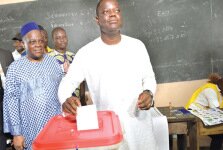African countries remain dependent on donors, despite the continent’s growing economy.

THE European Union on Monday unveiled a $270 million aid package to support Zimbabwe’s agriculture and health sectors, marking the resumption of direct funding after more than 10 years.
This came as the president of nearby Malawi pleaded with multilateral lenders for the resumption of aid to the country, which has in recent years had strained relations with donors, highlighting the continued dependence of African countries on aid despite the Africa Rising narrative.
At the signing ceremony for the aid programme, ET ambassador Philippe Van Damme termed it “an important step in our cooperation with Zimbabwe.”
Relations between Zimbabwe and the EU turned frosty following the 2002 elections, which foreign observers said were rigged to hand President Robert Mugabe victory.
The EU then slapped sanctions on Mugabe and members of his inner circle. In recent years, the European bloc has lifted sanctions and travel bans on senior government individuals.
But Mugabe, who has ruled as prime minister then head of state since 1980, remains under targeted EU sanctions, with his wife Grace, entailing a travel ban and asset freeze.
The direct government support will go towards boosting production in agriculture and improving health services as well as assisting with governance and institution building.
The $270-million (237-million-euro) programme is intended to cover development projects for the next six years.
“We look forward to work in all the strategic and important areas covered by this national … programme, with the aim to foster the political and economic reforms Zimbabwe is undertaking,” said the EU diplomat.
‘Lift sanctions’
Zimbabwe’s Finance Minister Patrick Chinamasa welcomed the EU aid, but asked for the “unconditional lifting of sanctions against our head of state and first lady”.
The EU early this month said that Mugabe may nevertheless be authorised to travel to Europe under specific circumstances in his capacity as current chairman of the African Union.
Last year, the EU issued a special invitation for Mugabe to attend an EU-Africa summit in Brussels, but he turned it down when his wife was denied a visa to travel with him.
“Zimbabwe Incorporated has a chief executive officer and as long as the chief executive remains under sanctions our relations as they remain poisoned and unproductive,” said Chinamasa.
Chinamasa used the opportunity to appeal for direct foreign investment from EU countries.
“Zimbabwe is open for business,” said Chinamasa. “I would therefore want to extend my invitation to European investors to come and invest in Zimbabwe.”

‘Won’t recur’
Last Friday, Malawian president Peter Mutharika on Friday pleaded with the World Bank to resume aid to the developing country.
Mutharika made the appeal when hosting the World Bank’s high level delegation of nine executive directors, adding that with donor-aid frozen, Malawians were suffering.
The World Bank and other donor members, who form the Common Approach to Budgetary Support, withdrew their support to Malawi’s national budget following the plundering of public finance dubbed “Cashgate” by the media.
However, the Malawian leader sought to assure the World Bank high level team that his new administration would ensure prudent fiscal discipline.
“We have seen the economic consequences of Cashgate and I promise that nothing of that nature will ever happen in this country again,” he said.
“However, we need that donor support.”
Mutharika said his country now had a good environment for foreign investment and he appealed to the global institution to help attract investment into Malawi. The World Bank team leader, Alinter Smith, said the bank would resume its budgetary support to Malawi after a further scrutiny of the country’s finance management systems.
“We have made it clear that the Bank is ready to support only upon implementation of the financial management systems,” Smith said.
The donor community contributes up to 40% of Malawi’s national budget.





